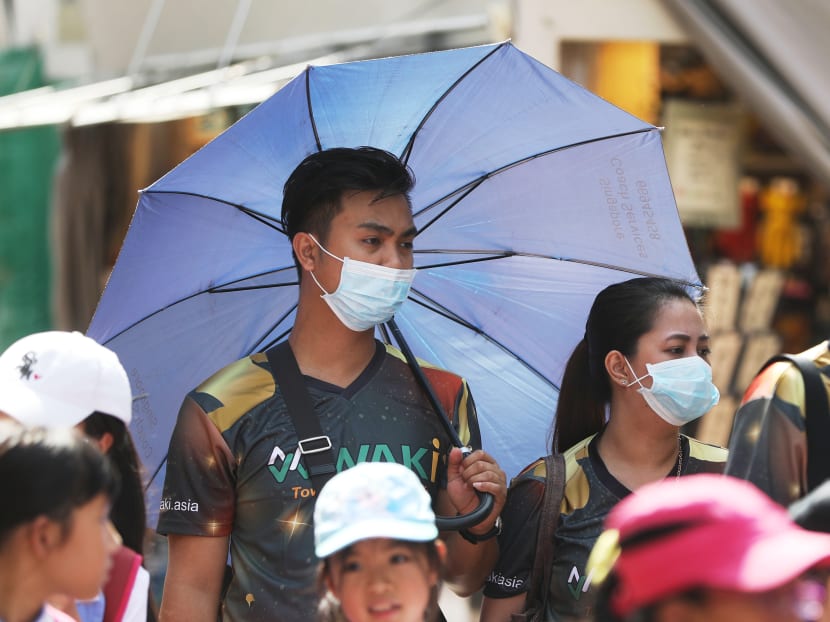Singapore working with international body to develop vaccine for novel coronavirus
SINGAPORE — Singapore is working “very closely” with an international body to deploy a vaccine against the novel coronavirus, said infectious diseases expert Wang Linfa on Monday (Feb 10).

Tourists in Chinatown wearing masks on Feb 4, 2020.
SINGAPORE — Singapore is working “very closely” with an international body to deploy a vaccine against the novel coronavirus, said infectious diseases expert Wang Linfa on Monday (Feb 10).
The Republic is working with the Coalition for Epidemic Preparedness Innovations (CEPI), a public-private coalition created to develop vaccines to stop future epidemics.
CEPI last week opened a call for proposals to rapidly develop and manufacture a vaccine that can be used against the novel coronavirus.
Under the CEPI initiative, front runners will be chosen by the end of this week, and they will be given at least 16 weeks to develop the vaccine. It will be then decided if the vaccine is ready for a Phase 1 clinical trial.
“We are trying to convince them to do a Phase 1 clinical trial in Singapore,” Professor Wang said.
Prof Wang, director of the Programme in Emerging Infectious Diseases at Duke-National University of Singapore (NUS) Medical School, was speaking at a media conference held at A*Star for scientists and researchers to share their work surrounding the novel coronavirus.
However, the vaccine could take some time yet. Associate Professor Hsu Li Yang, programme leader of Infectious Diseases at the NUS Saw Swee Hock School said it will be “probably at least a year” before there is a vaccine that is commercially available.
“That’s because the vaccine needs to be safe, it needs to be proven to be effective. Even if this outbreak is contained, which we all hope it will be, it will still be nice to have a vaccine, because at this point we don’t know if it will come back again,” he said.
Prof Wang said that if the virus remains the way it is — with minimal change among the cases seen in different countries, the vaccine may be able to offer long-term protection.
As of Monday, there were 45 confirmed cases of the virus in Singapore. There are more than 40,000 infected around the world, mostly in mainland China, and more than 900 have died from the disease.
LOOKING FOR MEDICINES THAT WORK
In the meantime, a few patients here have been given a drug typically used to treat the human immunodeficiency virus (HIV), said Associate Professor David Lye, director at the Infectious Disease Research and Training Office at the National Centre for Infectious Diseases (NCID).
When patients are given HIV medication, medical professionals look out for whether their oxygen requirement improves, whether their fever subsides, and whether their swabs come back negative for the coronavirus, he said.
“With the small number of patients and with people reporting their use in other countries in small numbers without detailed data, it’s very hard to say whether they work or not. Our experience is that in some patients, we see a very rapid response.
"But we also see people who continue to worsen and require assistance to breathe through a machine,” he said.
Assoc Prof Lye, who is in the World Health Organization’s protocol writing committee, is involved in designing a study to test the efficacy of existing medication against the novel coronavirus.
“The experts are working very hard to develop protocol, we are discussing how to design the study, what sort of patients do we include? If they are patients without symptoms, but they are positive, do you give them potentially drugs with side effects?"
The sort of drugs to be used is also being debated, he added. A drug tested for Ebola seemed to have “very good activity” for Middle East respiratory syndrome coronavirus (MERS-CoV) and the novel coronavirus in animal models, although it has not been used to treat the novel coronavirus in humans, he said.
“We need to be part of an international collaboration because there’s nothing worse than having a very small study and giving the wrong results,” he said.
NCID executive director Leo Yee Sin said that patients are being given supportive treatment in the meantime.
“This means making sure hydration and nutrition are maintained. If lung is the primary organ infected, you want to make sure that they have enough capacity to maintain a good oxygen level,” she said.
Assoc Prof Lye stressed the importance of an international study.
“We cannot be like in Severe Acute Respiratory Syndrome (Sars) time when we just used trial and error.”
“We hope to bring to our Singapore patients a proper randomised controlled trial very very soon,” he said. CNA
For more stories like this, visit cna.asia






